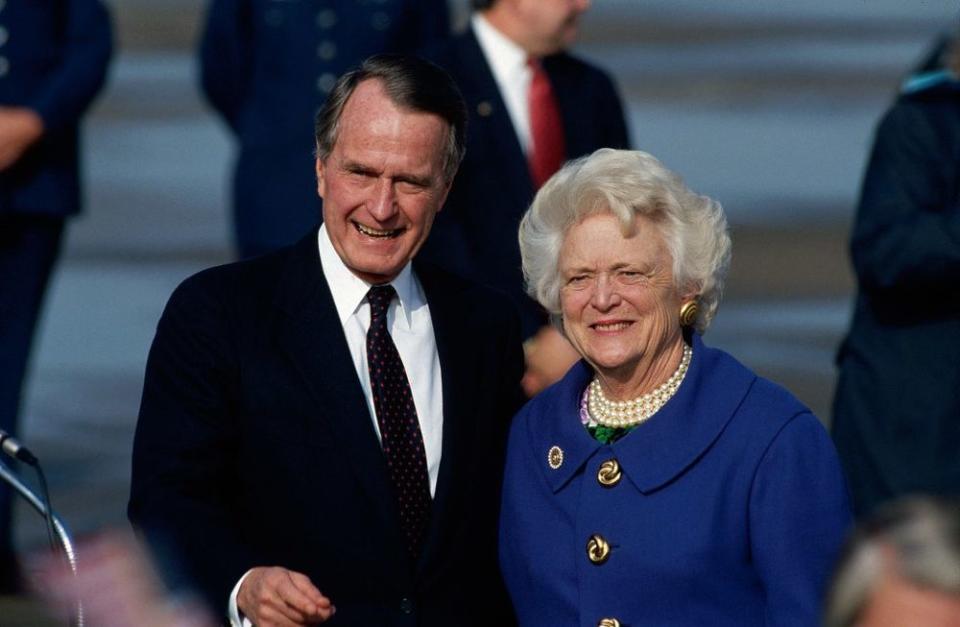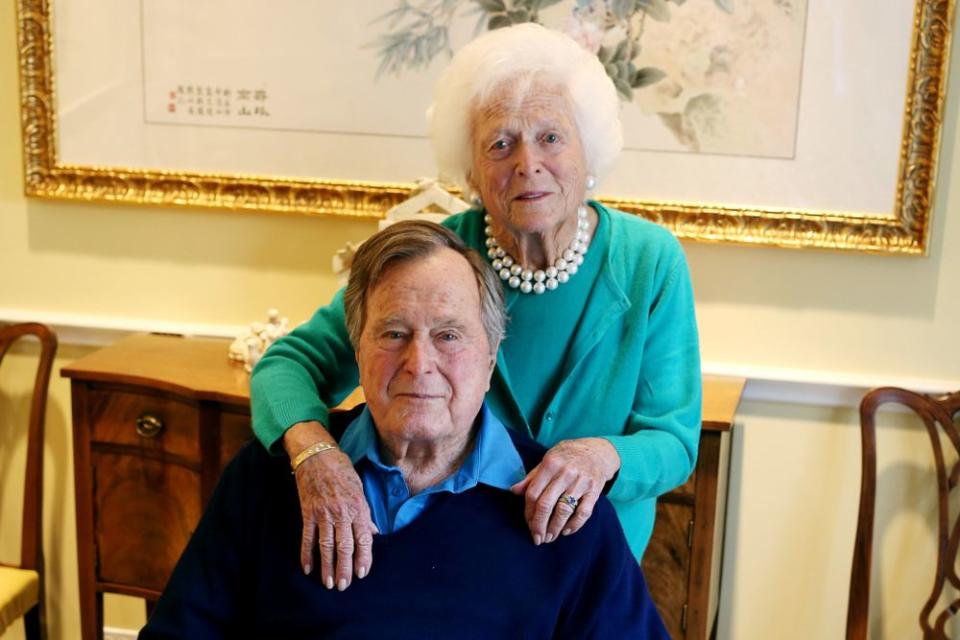Barbara Bush Once Thought About Killing Herself During Secret Depression: 'I Would Pull Over ... So I Wouldn’t Go Hit a Tree'
A darkness so deep that, at times, Barbara Bush wanted to die — to slam her car into another passing vehicle or steer into the nearest tree: This is how a new biography depicts one of the most challenging periods in the former first lady’s life, years before she went to the White House.
“I felt terrible,” Bush told journalist Susan Page in The Matriarch, which will be published on Tuesday. “I would pull over and park so I wouldn’t go hit a tree. I mean, I really felt that depressed.”
“I really wasn’t brave enough to do that, but that’s why I pulled over,” Bush said, “so I wouldn’t do that, or I wouldn’t run into another car.”
Bush, who died last spring at 92, sat for five interviews with Page. The Bush family also provided extensive access and Bush herself made her diaries available for Page to read and quote. Page spoke with 100-plus people for her book.
What emerges in The Matriarch, according to Page, is an account of an oft-beloved but often misunderstood figure in U.S. history.
“Barbara Bush was the public figure Americans felt they knew most but really understood least,” Page writes. “Many embraced her as a down-to-earth grandmother who sported a triple strand of faux pearls and joked about her wrinkles. That soft-focus impression wasn’t inaccurate, but it was decidedly incomplete.
“In my view, she stands as the most underestimated First Lady of modern times. And perhaps the most interesting.”
Among its detailed tracing of Bush’s life atop one of America’s preeminent political families, The Matriarch confirms just how much she disliked President Donald Trump, who rose to power savaging the Bushes.
Page’s biography also recounts how the former first lady grappled with depression the late ’70s, after she and husband George H. W. Bush returned from China where he’d been the top diplomat to Washington, D.C., so he could serve as CIA director.
It was something that, at the time, Mrs. Bush hid “from nearly everyone except her husband,” according to Page.
“Back in Washington, George Bush plunged into the demands of his new post, but Barbara Bush found herself falling into the worst personal crisis she had faced since daughter Robin had died more than two decades earlier. Overwhelmed by pain and loneliness, she contemplated suicide,” Page writes.
“After the crisis passed, she blamed a toxic combination of factors for the darkness,” Page continues, listing them off: There was the secrecy required of her husband’s CIA job, plus the hormonal effects of menopause, plus Mrs. Bush’s changing home life.
“I thought that was a fourth ingredient into it, besides the no-sharing the job, the children gone, the menopause, I thought the women’s movement, at that time — it isn’t so true anymore — sort of made women who stayed at home feel inadequate,” she told NPR in 1994.
Page also writes that, according to speculation from “some of those close” to the former first lady, one of her husband’s aides could have been creating a strain.

RELATED VIDEO: George W. Bush Slips Michelle Obama a Piece of Candy at His Father’s Funeral Service
Jennifer Fitzgerald first worked for George H. W. Bush while he was in China and later followed him back to D.C., then onto his campaign and the White House.
“Allegations that they had an affair would erupt during the 1988 and 1992 presidential campaigns. Both Bush and Fitzgerald would consistently deny them. So would Barbara Bush,” Page writes.
As PEOPLE reported in August 1992, President Bush replied sharply to a CNN question about the affair allegations, which by that point had made it to the New York Post.
“I’m not going to take any sleazy questions like that,” he said. “I’m not going to respond other than to say it’s a lie.”
Fitzgerald’s mother also spoke out, saying then: “She had a very unhappy marriage, and she can’t stand men,” according to the 1992 PEOPLE report. What’s more, Fitzgerald’s mother remembered her once saying, “I’ve been through so much. I couldn’t have sex with anybody.”
RELATED: Jenna Bush Hager Opens Up About the Loss of Grandparents George H. W. Bush and Barbara Bush
In The Matriarch, Page reports only that, according to “a woman who shared a friend’s beach house with Fitzgerald” in the ’70s, Fitzgerald “had begun what was at least a flirtatious relationship” with President Bush when he was then chairman of the Republican National Committee — including “giggly” phone calls and “whispered conversations.”
Still, the purported affair was never corroborated and remained vigorously denied.
Years later, Mrs. Bush reflected on her depression in her own memoir and the support her husband gave her:
“I swore to myself I would not burden him. Then he would come home, and I would tell him all about it. Night after night George held me weeping in his arms while I tried to explain my feelings. I almost wonder why he didn’t leave me.”

Her husband encouraged her to seek professional help, according to Page, and Mrs. Bush did try to broach the subject with her doctor — unsuccessfully.
“You didn’t say anything; I just thought you were tired,” he later told her, Page writes. To which Mrs. Bush said: “Well, I was tired, but tired of hurting.”
She has said that she did not remember when, exactly, her depression lifted. But it seemed to be around or sometime after she began volunteering an area hospital.
“I do not consider those miserable six months lost or wasted; I became much more sympathetic of people with emotional problems,” Mrs. Bush wrote in her memoir. “I used to think that you could control your emotions, that you just need to think of others and not yourself. … But I also realize you cannot handle everything alone. And when things go out of control, you should seek help.”
If you or someone you know is considering suicide, please contact the National Suicide Prevention Lifeline at 1-800-273-TALK (8255), text “home” to the Crisis Text Line at 741-741 or go to suicidepreventionlifeline.org.

